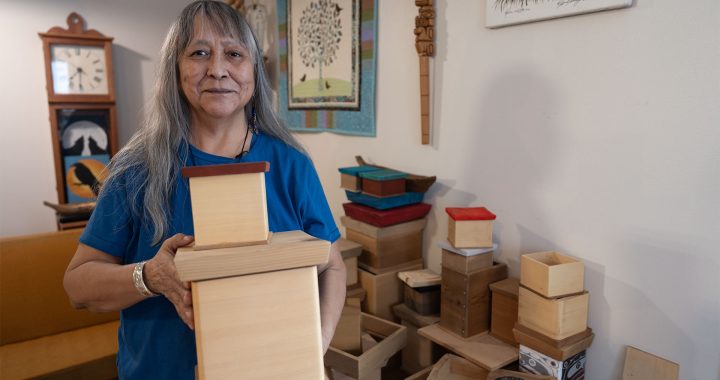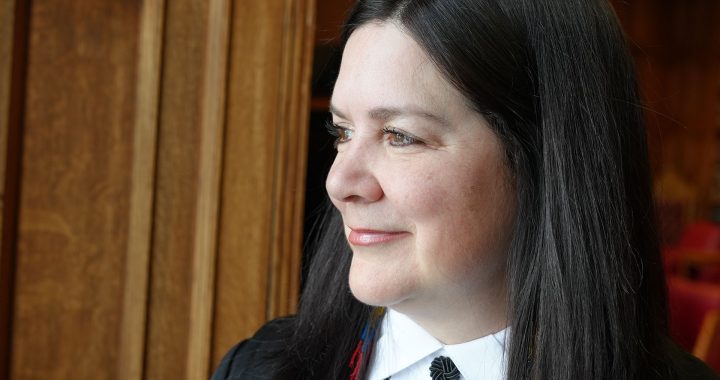Warning: This story shares graphic details from a murder trial. Please read with care.
Jeremy Skibicki’s defence team called an expert witness Tuesday to say the admitted serial killer in Winnipeg was likely suffering from paranoid schizophrenia.
It was the first time the Court of King’s Bench trial heard what may have sparked the killings of four Indigenous women in 2022.
Skibicki, 37, has admitted to killing Morgan Harris, Marcedes Myran, Rebecca Contois and an unidentified woman known as Mashkode Bizhiki’ikwe or Buffalo Woman, an Ojibwe spirit name for the victim police have been unable to identify.
Skibicki claims he is not criminally responsible due to a mental disorder (NCR).
Forensic psychiatrist and YouTuber Dr. Sohom Das, who is from England, said Skibicki was suffering from paranoid schizophrenia.
Das, court heard, has provided analysis for civil and criminal cases in the U.K. and been quoted as an expert on mental illness and criminality. In one of his YouTube videos, he outlines how to fake a mental illness and why accused killers confess.
The doctor said he diagnosed Skibicki after meeting with him twice – once in September 2022 and again in April 2024 – and reviewing his medical records.
“It was a mission from God,” Das testified of the murder spree between March 15, 2022 and May 16, 2022. “He heard the voice of an angel.
“He believed by killing these women he helped them get to heaven.”

- Defence lawyer Leonard Tailleur speaks to reporters outside the Winnipeg Law Courts building at the start of the trial. Photo: APTN News
Defence lawyer Leonard Tailleur asked whether Skibicki knew what he was doing was wrong and broke the law?
“Yes,” replied Das, who was on the witness stand for the full day.
But he’s not criminally responsible, Das added, because he was hearing voices and under delusions.
“I asked him whether he thought he was doing the right thing … and he said, ‘I was absolutely doing the right thing. It was a mission from God. I’m very clear on this.'”
In order to be found NCR, Court of King’s Bench Chief Justice Glenn Joyal needs to be convinced a mental illness made it impossible for Skibicki to understand the nature and quality of what he did or that it was morally wrong.
The Crown, on the other hand, needs to prove Skibicki had the intent and mental capacity to commit four homicides.
Over the past two-and-half weeks, Crown witnesses have painted a picture of a violent, racist and drug-fuelled man who preyed on homeless, Indigenous women.
They said victims were lured to Skibicki’s suburban apartment with the promise of drugs, then sexually and physically assaulted before being killed and thrown in the garbage. Skibicki had sex with the dead bodies before dismembering two of the women, court heard.
Only Contois’ remains have been recovered.
Das was the first witness called by the defence.
He has posted numerous videos on the channel “A Psych for Sore Minds,” including one where he admits to being duped by someone who didn’t have a mental illness.
Das said his assessments with Skibicki lasted 90 minutes. He said it was his job to summarize the information, not challenge it.
Read More:
Staffer testifies serial killer said he went to homeless shelter to find a victim
Among the records he reviewed were meetings with social workers and visits to hospital emergency rooms dating back to when Skibicki was 13 years old.
Tailleur said Skibicki’s parents called Child and Family Services several times after becoming alarmed by his increasing verbal and physical outbursts.
Skibicki also sleepwalked into a female cousin’s room and wrapped his hands around her throat “after hearing noises,” the lawyer added.
He was then, Das suggested, in “the early stages of a psychotic illness.”
Drug psychosis versus mental illness
Tailleur described the records as showing Skibicki, throughout his teens, demonstrating “cold”, “callous”, “apathetic”, “indifferent”, “aggressive” and “depressive” behaviour.
There were incidents of striking his mother, punching himself in the head, attempting to overdose, damaging property, stealing from his parents, abusing alcohol and drugs, being admitted to hospital and being arrested, Tailleur said.
He noted Skibicki had a history of using street and prescription drugs, and refusing therapy.
While the actions were “indicative of chronic schizophrenia,” Das said the question of Skibicki’s mental health wasn’t clear.
“This is what completely complicates this case,” said the doctor. “Whether it’s drug psychosis versus mental illness.”
In the alternative, Crown attorney Christian Vanderhooft suggested Skibiki was “making it up.”
He said Skibicki killed for pleasure – known as paraphilia – so he could have sex with the dead bodies.
“He likes to have power and control over women,” Vanderhooft added.
But Das said Skibicki “felt compelled” to have sex with the bodies.
He said “a voice” told Skibicki what to tell Winnipeg detectives. And, it was a combination of “voices in his head and stuff that came into his mind” when he committed the crimes.
“He describes being overtaken by a spirit?” Vanderhooft asked.
“Yes,” said Das, explaining it was a symptom of psychosis.
‘His symptoms come and go’
But the Crown attorney said this was coming out two years after Skibicki confessed to police and was preparing to go to trial.
“He needed a way to explain the confession he gave to police,” Vanderhooft suggested. “His confession is a different version of (the story) he told you.”
Again, Vanderhooft alleged Skibicki was “malingering” or pretending to be mentally ill.
“His symptoms come and go,” he noted.
However Das, by way of example, said Skibicki has “hateful thoughts that are out of touch with reality” and not simply racist. He suggested Skibicki had been ill since at least 2019.
Court has been told Skibicki describes himself as a Christian and a White supremacist.
By the time Skibicki was 25, court heard he was homeless and staying in a Winnipeg shelter – the same as his victims, who were poor, addicted to drugs and living on the streets.
Tailleur told court an emergency room doctor diagnosed Skibicki with schizophrenia.
But he didn’t refer Skibicki for a psychiatric assessment, noted Vanderhooft, and no forensic or other psychiatrist has ever reached that diagnosis.
“You don’t know if he saw the videos you produced?” he asked Das, in reference to his ‘faking’ video.
Skibicki is not mentally ill, the Crown said. He was an “organized” killer who “picked his victims assuming nobody would care where they were.”
The trial that began May 8 is scheduled to resume Wednesday morning.
With files by The Canadian Press
Support is available for anyone affected by these reports and the issue of missing and murdered Indigenous people. Immediate emotional assistance and crisis support are available 24 hours a day, seven days a week through a national hotline at 1-844-413-6649.










